Uluguru Mountains
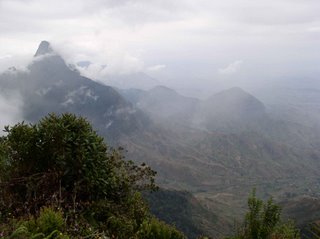
In the beginning, all these Tanzanian names sort of sounded like gibberish – Upanga, Udzungwa, Morogoro, Uluguru, etc. Now that I’ve been here a while they seem perfectly normal and the pronunciation is starting to roll off the tongue. One advantage here is that they are pronounced pretty much the way they’re read. The trip to the oo-loo-goo-roo mountains began as sort of a farewell to my friend Josh, an MD student colleague who is returning to the States to finish his final year of med school. A group of five of us (2 more would join us on Saturday) set out by taxi for the bus station where we would meet the Afriroots group, a small start up touring company that is focusing on short trips around Tanzania. They’re a good resource for people that work for international organizations and Harvard has tapped into them on more than one occasion, including my previous trip to the
We hopped on a locals bus for Morogoro. I’m not sure why things have to be so chaotic but for some reason they do. It doesn’t seem complicated to sell tickets for assigned seating, get on the bus, and drive to your destination. I think the mayhem of boarding the bus took longer than the drive itself. We got on, found our seats and then proceeded to watch the circus of people getting on, getting back off, exchanging seats and yelling the whole time. I don’t know enough Swahili to get everything that was said but I got the gist that they’d somehow double-booked some seats. That was only part of it, however, and it went on and on before we finally pulled out of the station. The seats were less than the width of either the Tanzanian or American ass so we were very cozy (and sweaty) to say the least.
Then there’s the body odor thing. Some Tanzanians have a particular smell that comes from, what I thought was their diet (and possibly the bathing infrequency of those less fortunate). I found out later that there is some sort of bacteria that gets on the skin and in clothes giving off this particular odor. Lack of hygiene gives it a rather pungency, however. Then you have popular sweet perfumes, colognes, diesel exhaust, and so forth. We had about 3 ½ hours of a chorus of smells that does take some getting used to.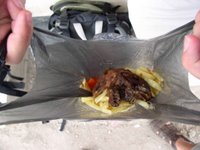
I did eat prior to getting on the bus. I had a little chicken and fries baggie thing that is the TZ equivalent of lunch to go. It’s pretty greasy but my healthy eating during the week lends itself to a little weekend whatever. Since I’m not training for triathlons like my baby sister…
We arrived at the bus depot in Mororgoro to the expected chaos. I’d been to this depot a couple of weeks before and it’s quite an experience. It’s a huge field of reddish dirt and hundreds of buses in various size, shape and condition. There’s the usual shouting and running around, people in bright colors, women carry massive loads on their heads, etc. When you get off the bus guys come at you like mosquitoes trying to sell you things and offer you taxis. Being white, once again, you have a hard time shaking these people. Sometimes, even after you’ve refused their offer, they just stand there and stare at you without saying anything, observing you like you’re some sort of freak.
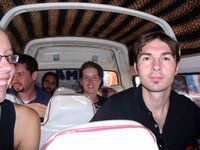 Our group gathered together and boarded a daladala, one of the most common East African methods of transport. It’s a small van that’s usually beat to hell and they cram people in like sardines. There’s a daladala depot near my office in Dar and you see these people diving in to get a precious seat only to be wedged in between a ton of other sweaty, dirty people. If you’re not sweaty and dirty when you get in, you will be by the time you get out. They follow fairly regular routes around the city stopping any time they see someone interested in riding and they have an available square inch or two. They’re about the size of Lisa’s old minivan and a friend of mine said he’s seen 26 crammed inside with various body parts sticking out the windows. It’s quite an experience. This day, however, we paid some guy to give us our own so we had a “comfortable” 14 passengers.
Our group gathered together and boarded a daladala, one of the most common East African methods of transport. It’s a small van that’s usually beat to hell and they cram people in like sardines. There’s a daladala depot near my office in Dar and you see these people diving in to get a precious seat only to be wedged in between a ton of other sweaty, dirty people. If you’re not sweaty and dirty when you get in, you will be by the time you get out. They follow fairly regular routes around the city stopping any time they see someone interested in riding and they have an available square inch or two. They’re about the size of Lisa’s old minivan and a friend of mine said he’s seen 26 crammed inside with various body parts sticking out the windows. It’s quite an experience. This day, however, we paid some guy to give us our own so we had a “comfortable” 14 passengers.
We drove through Morogoro to the base of the mountain and started our hike. Our plan was to go for about an hour and a half or so and meet up with Mejah, one of our guides, who, along with a crew of porters, was preparing dinner and setting up tents. It was starting to get dark as we walked and we were getting a beautiful evening view of the city below us. It’s still strange to do this sort of thing in
I shared a tent with Alex, a Romanian guy who has been living in
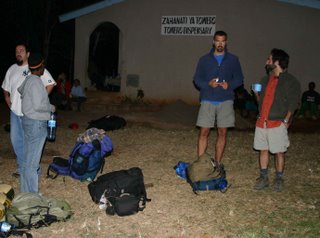 We arose early, had quick cup of coffee before heading up the trail for about and hour and a half or so to an old German outpost built in 1911. When the Germans were colonizing
We arose early, had quick cup of coffee before heading up the trail for about and hour and a half or so to an old German outpost built in 1911. When the Germans were colonizing 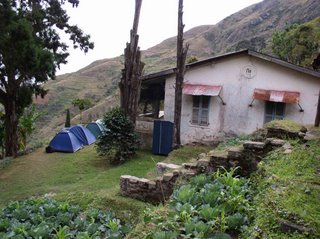
So the outpost was a residence of the guy responsible for this part of the country. There are a couple of buildings perched on the hillside overlooking the draw down to the city of
The trail meanders between steep terraced farmed land. The area is inhabited by the Luguru tribe, a very interesting bunch of about fifty clans that take advantage of wiped out ra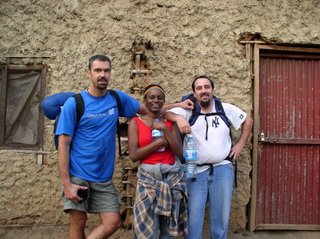 After about an hour we entered ra
After about an hour we entered ra
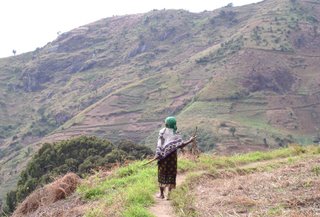 We took photos, rested, walked around a bit and had sandwiches. Most of the group wasn’t in very good hiking shape and were dreading the trip down. Like my brother often says for the trip down, it’s every man for himself. I flew down the mountain alone, sometimes precariously, well ahead of the group. I stopped occasionally thinking I heard monkeys but saw none. It was fun to be alone in the African ra
We took photos, rested, walked around a bit and had sandwiches. Most of the group wasn’t in very good hiking shape and were dreading the trip down. Like my brother often says for the trip down, it’s every man for himself. I flew down the mountain alone, sometimes precariously, well ahead of the group. I stopped occasionally thinking I heard monkeys but saw none. It was fun to be alone in the African ra
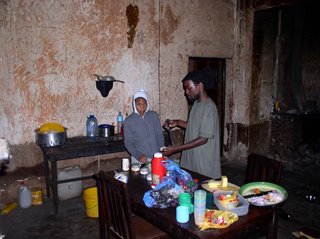 I arrived back at the outpost and our friends Manisha (Indian) and Antje (my German roommate) had arrived. They’d driven up from Dar that morning and we going to spend the afternoon and evening with us. We sat and chatted as the rest of the hikers filed in over the next 2 hours. The evening consisted of dinner on the porch of the outpost and then later a small bonfire. It was fairly subdued since most of the hikers were pretty wiped out.
I arrived back at the outpost and our friends Manisha (Indian) and Antje (my German roommate) had arrived. They’d driven up from Dar that morning and we going to spend the afternoon and evening with us. We sat and chatted as the rest of the hikers filed in over the next 2 hours. The evening consisted of dinner on the porch of the outpost and then later a small bonfire. It was fairly subdued since most of the hikers were pretty wiped out.
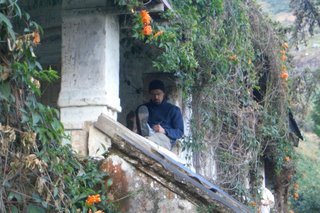 car pointed to another trip to
car pointed to another trip to

0 Comments:
Post a Comment
<< Home